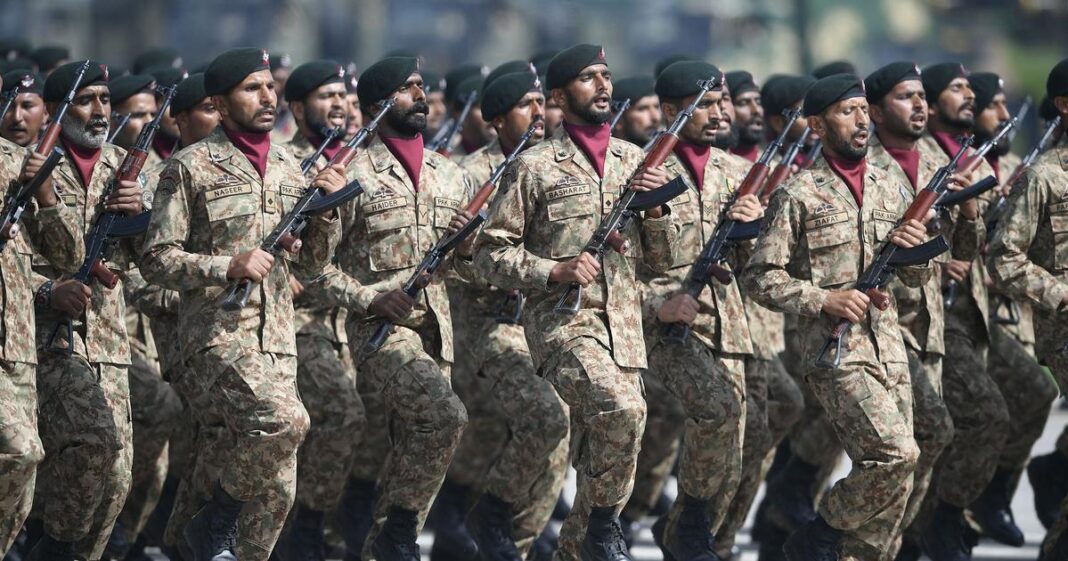The hotly contested election threw up a huge surprise with independents in Pakistan — who are backed by the imprisoned former prime minister Imran Khan’s Tehreek-e-Insaaf (PTI) party – winning maximum seats (98 of 264), despite Pakistani establishment (army) leaving no stone unturned to keep Imran Khan and members of his party from the election process.
This definitely indicates what most of the people of Pakistan want in their heart. Because, the notion was former Prime Minister Nawaz Sharif’s Pakistan Muslim League-Nawaz (PML-N), would win, with backing from the army.
Ironically, it was the Pakistan army which ousted Nawaz Sharif’s government and after previous elections, brought Imran Khan to power, despite not having majority.
Then after being in power for three-and-a-half years of poor policy decisions, Khan’s government fell out of favour with the Army and subsequently, the establishment engineered the fall of PTI government through no confidence vote in parliament.
Pakistan, unfortunately, is a state which since its birth is being failed by politician and military leaders with psychology of incompetence. For their own gain, those leaders have always been keeping the public diverted with wrong agenda and anti-Hindu propaganda, thereby taking opportunity to wrongly play with country’s coffer at the cost of its progress.
Since 1957, Pakistan has had 18 prime ministers, aside from the appointed caretaker prime ministers who were only mandated to oversee the system until the election process was finished.
Unfortunately, not a single full-time PM of Pakistan has been able to serve for full five years. They have been either killed or removed by the army on its own whims and fancies.
Pakistan has a history of political coups and unrest. The current political mess in the country is just an extension of army’s interference in politics. Due to this, Pakistan today is in a point of no return.
Pakistan’s first Prime Minister Liaquat Ali Khan, after the 1947 partition of India, was shot dead at a political rally in Rawalpindi.
In 1958, Pakistan’s first military coup occurred after Governor-General Iskander Mirza enforced martial law with General Ayub Khan as chief martial law administrator. Ayub Khan later assumed the presidency, sacked and exiled Mirza.
In 1979, the then PM Zulfiqar Ali Bhutto, was hanged on a disputed conviction for conspiring to commit a political murder by Army chief Zia ul-Haq after seizing power by overthrowing Bhutto government.
Two-time Prime Minister Benazir Bhutto was assassinated in a gun and bomb attack after holding an election rally in Rawalpindi in 2007.
Former army chief Pervez Musharraf seized power in a bloodless coup and overthrew the Nawaz Sharif government.
The problem is, Pakistani army doesn’t want to mend its ways because it’s addicted to power.
Best example of this is allegations of rigging the election results, which was favouring Imran Khan-backed independent candidates. In current scenario, a coalition government is the only answer, but that may struggle to muster the political strength to push through much-needed economic reforms and take on serious governance and security challenges.
So, ultimately the army will continue to call the shots, even if it doesn’t officially imposes martial law. It means a puppet government would be in place.
Today the country is near bankruptcy, but internal political and military conflict is going on unabated.
The unstable political situation would definitely have impact on the economic and security challenges of Pakistan.
IMF loan is essential for Pakistan to be bailed out from present economic crisis. For this, IMF, United States, China and Gulf powers would definitely look for stable Pak Government. But the present situation may not provide a conducive situation in obtaining IMF loan.
For Pakistan to come out from present quagmire it needs a strong politico-military relationship with both doing their respective duties and good neighbourly and international relation. Their money must be spent on economic developments than unnecessary defense spree.
A stable and economically powerful Pakistan with good neighbourly relations will be a great asset to India. For this to happen, it’s army must leave governance to political leadership and return to the barracks.
One feels sad for the people of Pakistan, which has never really seen democracy lasting in the country.
India has a long history of democracy. More importantly, India never had martial law.
Indian armed forces respects the Constitution and go by the book. It doesn’t harbour political ambitions. It restricts itself to the core duty to provide national security and help the civil administration in case of any emergency like natural disaster.
That’s why Indian armed forces have never lost a war, while Pakistan has lost all of India. Despite its imperfections, political stability has been India’s hallmark which has led to economic growth.
But Pakistan army still doesn’t want to learn any lesson and continues to push its country on the path of self destruction. If this socio-political instability continues, there could be more instability and strife in the neighborhood. That’s bad news for India.
.heraldgoa.in

